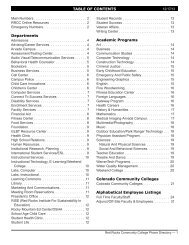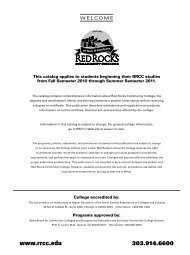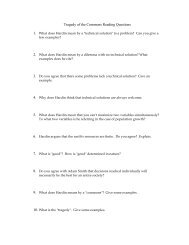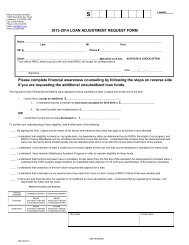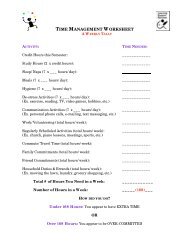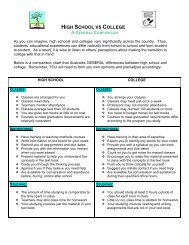opportunities, options, excellence - Red Rocks Community College
opportunities, options, excellence - Red Rocks Community College
opportunities, options, excellence - Red Rocks Community College
You also want an ePaper? Increase the reach of your titles
YUMPU automatically turns print PDFs into web optimized ePapers that Google loves.
signs and symptoms of common disorders, to<br />
further evaluate those disorders through<br />
appropriate testing and to prepare a treatment<br />
plan to preserve health or mitigate suffering.<br />
PAP 223 Pediatrics<br />
2 Credits<br />
The course is designed to emphasize primary<br />
care of the child from birth through adolescence.<br />
Students are exposed to techniques of<br />
history taking and physical examination specific<br />
to the pediatric population. Knowledge<br />
of problems unique to the adolescent will be<br />
discussed to enable students to develop skills<br />
in education of the adolescent on drug abuse,<br />
identity issues, human sexuality, peer pressure<br />
and resources for referral.<br />
PAP 224 Introduction to Surgery<br />
1 Credit<br />
The object of this course is to provide the student<br />
with an introduction to the etiology, evaluation<br />
and initial management of common<br />
surgical complications and care of the surgical<br />
patient will be discussed.<br />
PAP 225 Women’s Health Care<br />
1 Credit<br />
This course provides an exposure to problems<br />
and issues associated with women’s health<br />
care, primarily in the ambulatory setting.<br />
Emphasis is placed on family planning and<br />
birth control; recognition and treatment of<br />
sexually transmitted disease; cancer detection;<br />
prenatal care; and the evaluation of common<br />
gynecologic problems.<br />
PAP 226 Clinical Procedures<br />
1 Credit<br />
This course is designed to teach students<br />
basic diagnostic and therapeutic clinical skills<br />
and procedures. Preparation of the patient,<br />
anatomical considerations, patient consent,<br />
potential complications and clarification of<br />
therapeutic and diagnostic value of clinical<br />
procedures will be discussed. WOund management,<br />
anesthesia, suturing techniques,<br />
injections and IV access, nasogastric incubation,<br />
and immobilization via casting and<br />
splinting will be covered.<br />
PAP 230 Pharmacology I<br />
1 Credit<br />
This course begins the study of therapeutic<br />
pharmacology, with emphasis on pharmacokinetics<br />
and pharmacodynamics. The physiology<br />
that underlies drug contraindications, interactions<br />
and adverse effects are reviewed.<br />
PAP 231 Pharmacology II<br />
3 Credits<br />
Students learn to apply the principles of pharmacology<br />
to the prevention and treatment of<br />
specific human disorders. Special emphasis is<br />
placed on the safe and appropriate use of<br />
medications.<br />
PAP 235 Human Pathology<br />
4 Credits<br />
Co-requisite: Clinical Medicine<br />
Learners focus on the clinical pathophysiology<br />
of human illness. Individual modules are<br />
devoted to an examination of the cellular and<br />
organ-based aspects of disease, with attention<br />
to how the disease process begins and proceeds.<br />
Where appropriate, presentations in<br />
Clinical Medicine will accompany the presentations<br />
in this course.<br />
PAP 240 Behavioral Science for the<br />
Physician Assistant<br />
3 Credits<br />
Students explore the relationship between<br />
physical illness and psychosocial issues in the<br />
medical setting. Interviewing and communication<br />
styles unique to behavioral medicine<br />
will be discussed. The presentation and recognition<br />
of major psychiatric disorders, mood<br />
and anxiety disorders and substance abuse<br />
and the appropriate role of psychotherapeutic<br />
agents will be discussed.<br />
PAP 260 - 269<br />
4 Credits<br />
This year-long series of highly structured offcampus<br />
clinical experiences pairs PA students<br />
with practicing clinicians who supervise them<br />
in the evaluation and treatment of patients.<br />
Rotations are conducted in a variety of inpatient,<br />
outpatient and long-term care settings.<br />
PAR - PARK RANGER<br />
TECHNOLOGY<br />
PAR 102 Introduction to Park<br />
Ranger Technology<br />
3 Credits<br />
This introductory course covers the development<br />
of public lands in the United States, the<br />
various agencies controlling those lands,<br />
multi-use doctrine, wilderness, public services<br />
provided in parks and the various roles of the<br />
park ranger in different settings Discussed are<br />
career planning and park ranger responsibilities,<br />
such as law enforcement, natural<br />
resource management, protection and interpretation,<br />
cultural resource interpretation, visitor<br />
services, emergency management and<br />
training.<br />
PAR 203 Natural Resource<br />
Management<br />
3 Credits<br />
Prerequisite:PAR 102<br />
This course introduces various scientific disciplines<br />
and complex issues associated with<br />
natural resource management. Ecosystem<br />
management, wildlife management, plant<br />
ecology, agricultural management, career<br />
planning, public land acquisition, visitor use,<br />
natural resource law enforcement and public<br />
policy are introduced and discussed in detail.<br />
PAR 205 Resource Interpretation<br />
3 Credits<br />
This is a basic course in natural and cultural<br />
resource interpretation. The philosophy, techniques<br />
and skills necessary to produce exciting<br />
and relevant resource interpretation projects<br />
are discussed and practiced. Interpretive<br />
plans are discussed in detail, as well as various<br />
techniques used in the field of resource<br />
interpretation and public education. The history<br />
and development of environmental education<br />
and natural/cultural resource interpretation<br />
are discussed. Multi-use conflict solutions<br />
via public education and resource interpretation<br />
are emphasized.<br />
PAR 218 Outdoor Leadership<br />
3 Credits<br />
This course is an introduction to the development,<br />
acquisition and application of outdoor<br />
leadership skills and knowledge. Students are<br />
exposed to the latest information, philosophy<br />
and techniques necessary to safely conduct<br />
outdoor programs and expeditions as an outdoor<br />
leader. Skills are applied under actual<br />
field conditions. Emphasis is on minimum<br />
impact camping, wilderness ecology, judgement,<br />
decision making, group dynamics and<br />
trip logistics. These skills enjance the effectiveness<br />
of students as a professional outdoor<br />
leader.<br />
PAR 230 Park Ranger Law<br />
Enforcement Training<br />
3 Credits<br />
Prerequisites: PAR 102 or recent seasonal<br />
park employment or permission of the<br />
instructor<br />
This course is an intensive academy for<br />
unarmed park rangers who work in local government<br />
parks and open space districts. The<br />
focus is on ranger safety, regulation<br />
enforcemtn, incident command, limits of<br />
authority, visitor contact, communications and<br />
situational control techniques. Topics vary<br />
depending upon the need.<br />
161 2002 - 2003 <strong>Red</strong> <strong>Rocks</strong> <strong>Community</strong> <strong>College</strong> Catalog









